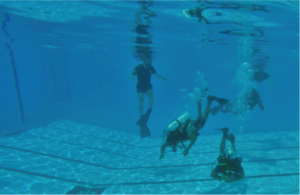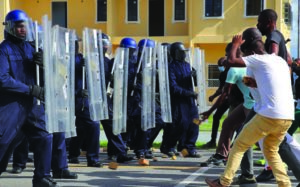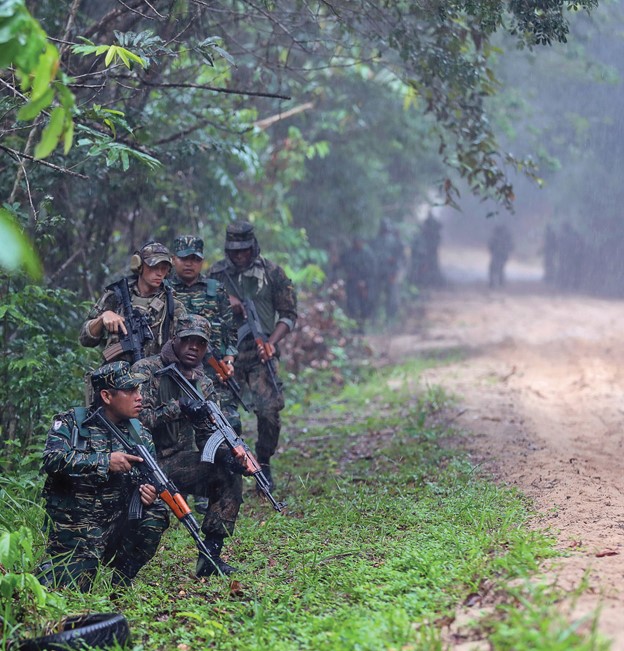Nestled inside the Captain’s meeting room aboard a ship sit two women. Suddenly, three men in blue military service uniforms and armed with assault rifles burst in and begin to search the area while another armed man takes the women to the main deck for interrogation about suspicions of human trafficking.
Meanwhile, at a nearby location, a protest has turned violent. Tires have been set ablaze, and riot police are being pelted with a barrage of bricks, raw potatoes, wooden blocks, and Molotov cocktails, as the local populace has grown weary of the curfews and quarantine measures set in place due to the COVID-19 pandemic.
Welcome to Tradewinds 2021.
The scenarios mentioned above are just two of several training mechanisms that the Guyana Defence Force and other Caribbean countries practiced during the exercise, which Guyana hosted after it was postponed in 2020 due to the COVID-19 pandemic. From June 13-25, 2021, representatives from the United States and 12 partner nations participated in the event, where a variety of exercises and training scenarios were conducted.
The Bahamas, Barbados, Belize, Bermuda, Brazil, Canada, the Dominican Republic, France, Great Britain, Jamaica, the Netherlands, and Trinidad and Tobago were the participating countries.
Since the mid-1980s, U.S. Southern Command (SOUTHCOM) has been sponsoring this joint exercise in the Caribbean with partner nations. Tradewinds is designed to enhance the collective ability of defense forces and constabularies to counter transnational criminal organizations and conduct humanitarian assistance and disaster relief operations. Developing strong relationships and reinforcing human rights awareness is also emphasized in this yearly exercise.
The exercise also included training on firearms trafficking and tracing; explosive ordinance disposal; public order and riot control; close quarters combat; small arms instruction; advanced rifle marksmanship; non-lethal weapons; women, peace, and security; tactical combat casualty care; arrests, search, and seizure (land and maritime); and vehicle takedowns.
“The overall objective from all of us who participated here is to ensure we build an international coalition to ensure the peace and stability of this region,” said Guyanese President Irfaan Ali during a reception the day before the closing ceremonies. “It’s also to ensure the security, and to ensure this region never becomes a safe haven for transnational crime,” President Ali added. He also said he would like to see participating countries continue their strong networking and the building of integral relationships.
During the closing ceremonies held at Guyana National Stadium, U.S. Army Major General Rafael Ribas, SOUTHCOM deputy commander for Mobilization and Reserve Affairs, said that the array of skills learned throughout Tradewinds would see a better synchronization of countries responding to natural disasters and security threats.
“We may not know when the next big crisis might come, but we must continue to train together to conquer it,” Maj. Gen. Ribas said. “Exercises of this magnitude illustrate the importance of partnerships when responding to a crisis, and the knowledge gained will not only aid in faster responses but allow countries to prepare better and recover faster from threats and crises.”

with a U.S. Special Forces dive team to provide
training on how to plan and execute dive
missions in a multinational environment at
Base Camp Stephenson in Timehri, Guyana. (Photo: Lieutenant Nora Amrane/Canadian Armed Forces)
Women, Peace, and Security
Included this year for the first time was the Women, Peace, and Security (WPS) program. The program is part of a U.S. effort to promote the meaningful contributions of women in the defense and security sectors worldwide. WPS is centered on four pillars: participation, prevention, protection, and relief and recovery.
This foundation provides unique engagement opportunities to strengthen bilateral relationships with regional partners through collective efforts that reinforce women’s empowerment, meaningful participation in decision making, protection from violence, and access to resources.
The United Nations Security Council established the WPS agenda in 2000, which recognizes a basic premise: The involvement of women in efforts to build peace and maintain security leads to better security outcomes for everyone.
During Tradewinds, more than 200 soldiers and law enforcement personnel from partner nations were given a course on the importance of promoting and integrating women in the defense and security sectors. The course also enhanced their knowledge of gender perspectives and the WPS global effort, as well as the ability to discuss the benefits of applying gender perspectives in defense and security institutions, along with the inclusion of women in decision-making.
A presentation made during the event showed that peace agreements were 35 percent more likely to last at least 15 years when women participated. The participation of women also made these agreements 64 percent less likely to fail.
Throughout the two-week exercise, members of SOUTHCOM’s WPS team, in conjunction with Dr. Fabiana Perera, an expert from the William J. Perry Center for Hemispheric Defense Studies in Washington D.C., as well as Lieutenant Colonel Natasha Stanford, the most senior ranking woman in the Guyana Defence Force, administered these courses.

Law Enforcement Concepts
Another aspect that was introduced this year for Tradewinds was the law enforcement concept, whereby law enforcement agencies from the U.S. government were integrated along with partner nations to provide training to regional law enforcement entities.
In a span of 10 days the law enforcement working group coordinated and trained a total of 353 partner defense and police forces on 12 events. One of the agencies participating in the working group was the U.S. Drug Enforcement Administration (DEA). Assembled from regional offices across the U.S., a small four-person DEA team responded to a request for assistance from the U.S. Army’s 7th Special Forces Group, to augment their team in Guyana for the Tradewinds exercise.
“We are committed to working with our partners to counter transnational criminal organizations that threaten safety and the stability in the region,” said DEA Special Agent Billy Parker. “Getting to train with the 7th Group and partner nations during Tradewinds has been an amazing experience for all parties. We’re all in this together.”
The law enforcement working group intends to invite more agencies for next year’s event as they look to expand their scope.
The Importance of Human Rights Training Members of SOUTHCOM’s Human Rights Office, as well as an instructor from the Western Hemisphere Institute for Security Cooperation (WHINSEC), spoke to soldiers and law enforcement officers in a classroom environment on the importance of human rights and the rule of law.
Examples of past war crimes, human rights atrocities, and current scenarios involving human trafficking and smuggling were presented with the classroom encouraged to participate. The intended takeaway for attendees was to understand their obligation to respect and protect human rights, and to report all suspected violations of fundamental human rights. Lessons learned were later applied in a field training environment such as the search and seizure exercise that was conducted aboard a ship.
“We worked at several locations where we facilitated human rights discussions and evaluated the human rights scenarios that were part of the exercise,” said U.S. Army Sergeant First Class Javier Perez, a WHINSEC instructor and human rights subject matter expert. “The exercise participants greatly appreciated WHINSEC human rights expertise in the classroom and during field training exercises. They are very interested in our Human Rights Program, the NCO Academy, and the instructor course we offer,” he added.
The next iteration of Tradewinds will be held in Belize and Mexico in 2022.









